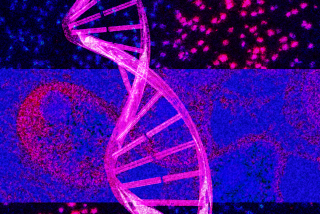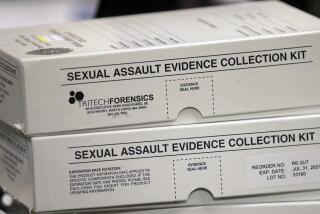Supreme Court to decide if police can collect DNA from suspects
- Share via
WASHINGTON -- The Supreme Court agreed Friday to resolve a national debate over the collection of DNA and decide whether police across the country may take a saliva sample from all people who are arrested for serious or violent crimes.
Prosecutors and judges say DNA has a unique ability to convict the guilty and free the innocent. And the FBI now has a growing national database of DNA samples from convicted criminals. All 50 states now collect DNA from those who are convicted of felonies.
But in the last decade, more than half of the states, including California, have gone further and require the collection of DNA from people who are arrested for serious crimes. Typically, people taken into custody for a violent crime are required to submit to a mouth swab or blood sample.
But judges in several states, including Maryland, have ruled that this forced collection of DNA from suspects who are presumed innocent violates the Constitution’s ban on unreasonable searches. The Maryland Court of Appeals said those arrested have a “presumption of innocence” and a right to “be free from biological searches.” The ruling overturned the rape conviction of Alonzo King, who was convicted after his arrest on an unrelated assault charge.
The Supreme Court said Friday it would hear the case of Maryland vs. King to decide whether the state’s interest in crime fighting outweighs the privacy right of a suspect under arrest. In defending their law, Maryland prosecutors compared collecting DNA to taking a fingerprint, neither of which poses a significant intrusion on personal privacy, they said.
Victims rights groups said DNA matches from those who are arrested could stop repeat criminals wanted for unsolved rapes and murders.
Some civil liberties advocates say DNA differs fundamentally from a fingerprint because it reveals the genetic makeup of an individual. They also note that investigators in several states, including California, have used DNA from arrested people to find and apprehend relatives who are wanted for crimes.
California’s voters approved the mandatory collection of DNA samples from people, including juveniles, who are arrested for felony crimes. The law took effect in 2009.
Critics say California’s law is more stringent than many because the DNA samples are not automatically thrown out if the arrested person is set free or acquitted of the charges. In September, the U.S. 9thCircuit Court of Appeals heard a constitutional challenge to the law, but no decision has been handed down.
ALSO:
Price of Thanksgiving dinner gobbles up a few cents more
Conjoined twin girls successfully separated in 7-hour surgery
Robert Bales case: Army investigators were delayed three weeks
More to Read
Sign up for Essential California
The most important California stories and recommendations in your inbox every morning.
You may occasionally receive promotional content from the Los Angeles Times.











